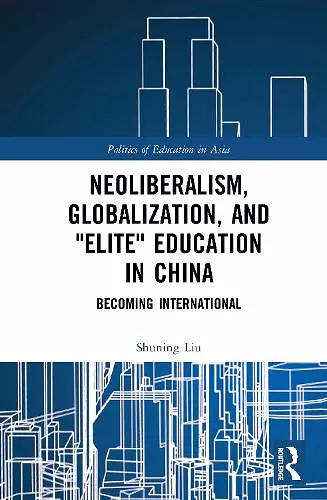Neoliberalism, Globalization, and "Elite" Education in China
Becoming International
Format:Hardback
Publisher:Taylor & Francis Ltd
Published:9th Apr '20
Currently unavailable, and unfortunately no date known when it will be back
This hardback is available in another edition too:
- Paperback£41.99(9780367784010)

This book examines the practices and effects of emerging international curriculum programs established by Chinese elite public high schools and supported by China’s New Curriculum Reform and the Chinese-Foreign Cooperation in Running Schools (CFCRS) policy. Drawing on critical theory, the book applies sociological and anthropological approaches to the study of the educational practices of such curriculum programs and the rising Chinese elite class, as well as educational policy globally. Through analyzing a wide variety of data sources, this book focuses on examining how changing local and global contexts have influenced and shaped the educational opportunities, experiences, and aspirations of privileged urban Chinese students who are able to attend these programs and who hope to study at U.S. universities. In doing so, the book is intended to define the problematics of the internationalization of Chinese education and an emergent form of elite education in China, which are complex and embedded in the process of modernization in China.
Neoliberalism, Globalization, and "Elite" Education in China: Becoming International will appeal to undergraduates, postgraduates, and academics in the fields of curriculum studies, educational policy studies, sociology of education, and anthropology of education, as well as policymakers with an interest in globalization and education, education policy, and education and international development.
"Neoliberalism, Globalization, and "Elite" Education in China: Becoming International represents a stunning achievement. Through rigorously engaged multi-sited ethnography, Shuning Liu takes us into the world of today’s Chinese elite class as it strives to position the next generation for entrance into elite U.S. postsecondary institutions. Traversing emerging new policies and practices within the Chinese high school sector, including internationally focused high school curriculum programs as a new development within "key" public schools, Liu spotlights the ways in which competition for globally situated class positionality via elite U.S. postsecondary institutions structures and permeates inequalities in educational opportunities and outcomes both within and between nations. In so doing, Liu’s work demands recognition that within-nation class production must increasingly be understood as occurring on global terrain, with stark consequences for class "winners" and "losers" across the globe. This is a "must read" for anyone interested in the production of class inequalities and student subjectivities and outcomes as linked to social and economic stratification."
-Lois Weis, State University of New York Distinguished Professor, University at Buffalo, USA
"Liu’s book is a rigorous, timely and fascinating multidimensional study of how global education student subjects are formed in elite settings in China. It focuses on how privilege is achieved and experienced within specific local and global educational programmes and institutions. It adds enormously to our understanding of the role of education in struggles for economic advantage on the global stage. In this book, Liu joins up and explores both general patterns of social advantage within elite educational settings in China and the experience of privilege by students seeking to gain access to elite Western institutions. It shows us how neoliberal sensibilities are played out through one international high school curriculum programme, and how this programme forms global student subjects. This is a significant contribution to our understanding of global education."
-Stephen J Ball, Emeritus Professor of Sociology of Education, University College London, UK
"This book was a total pleasure to read, as well as being informative and thought-provoking. The book also contributes to understandings of how privileged Chinese families prepare young people for international study (in this case, in the US), in the context of a global higher education market. As a geographer, I found the account of the production of an 'international' educational space (the international school) particularly fascinating. I cannot recommend this book highly enough to all academics working in areas of elite migration, education, Chinese families and internationalisation and look forward to using in my teaching right away."
-Johanna L. Waters, Professor of Human Geography, University College London, UK
"Drawing on multi-sited ethnography and straddling two major fields of inquiry, elite education and international education, Liu’s study provides an in-depth understanding of the formation of globally situated elite subjectivities and neoliberal sensibilities through the emerging international curricular tracks in elite public high schools as a pathway into the U.S. postsecondary sector. Liu’s study not only enriches the sociology of elite education that has primarily targeted Western countries to date, but also expands our knowledge of an alternative form of international education that is inserted into local schools and anchored to national curriculum reforms in one of Asia Pacific’s strong states, China."
-Jinting Wu & Qichang Tang, Review in Teachers College Record
ISBN: 9781138326248
Dimensions: unknown
Weight: 453g
196 pages